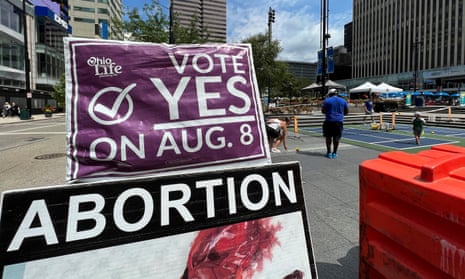
Voters on Sunday in Norwood, Ohio. Photograph: Darron Cummings/AP
Voters on Sunday in Norwood, Ohio. Photograph: Darron Cummings/AP
Show key events only
Please turn on JavaScript to use this feature
Live feed
Both abortion rights and democracy at stake in Ohio election
If voters today approve Issue 1, the Republican-backed measure that would make it harder to change Ohio’s state constitution via the popular vote, the impacts will extend beyond abortion rights.
While Issue 1’s passage would make it much more difficult for a constitutional amendment protecting access to the procedure to qualify for the November ballot, it would also help the state’s Republican lawmakers protect their political power. How? The Guardian’s Sam Levine explains:
Currently, Ohio requires activists to get a certain number of signatures on petitions, both statewide and in 44 of 88 counties, to send an amendment to the ballot. In each of the 44 counties, the total number of signatures needs to be equivalent to 5% of the vote in that county in the last gubernatorial race. Statewide, the total has to be equivalent to 10% of the same.
Issue 1, the only question on Tuesday’s ballot, would make that process considerably harder. It would require supporters to get the signatures in all 88 counties and then obtain a 60% supermajority for an amendment to pass.
The vote comes just three months before Ohio is to rule on a constitutional amendment to protect abortion rights in November. Republicans have openly said that Issue 1 is an attempt to block the abortion measure from passing.
The vote is also an effort to preserve Republican political power in Ohio. Activists in the state are crafting a constitutional amendment that would strip state lawmakers of their ability to draw electoral districts and hand it over to an independent commission instead. Last year, Republicans repeatedly ignored rebukes from the supreme court calling for the redrawing of district lines because they were too distorted in favor of Republicans. Republicans eventually ran out the clock, preserved their supermajority in the state legislature, and then used that supermajority to refer Issue 1 to the ballot.
Polling has been limited and it is difficult to predict the results of a ballot referendum. The average of three polls, all of which have slightly different wording, have shown 35% of Ohioans support the change, 45% oppose it, and 20% aren’t sure, according to FiveThirtyEight. Similar measures to raise the threshold for constitutional amendments in other states have failed in recent years, the outlet noted.
If the measure passes, opponents say, it would effectively institute minority rule in Ohio. Supporters say it should be harder for citizens to amend the state constitution. That argument is not supported by data – roughly 75% of the citizen-initiated constitutional amendments over the last century have failed. Ohio also allows the legislature to send constitutional amendments to the ballot and voters have approved 106 out of 157 since 1914, according to cleveland.com.
Key events
Show key events only
Please turn on JavaScript to use this feature

Joanna Walters
Who is James Uthmeier, Florida governor Ron DeSantis’s newly-designated campaign manager for the Republican’s presidential bid?
Another youthful face now at the head of extremist DeSantis’s campaign, Uthmeier was gubernatorial chief of staff after being DeSantis’s general counsel, but he’s also a former senior adviser to Wilbur Ross, a controversial commerce secretary in the Trump administration.
🚨BREAKING: Ron DeSantis has replaced his presidential campaign manager, Generra Peck, with his gubernatorial office’s chief of staff, James Uthmeier.
This latest shakeup comes after the DeSantis shed his staff in mid-July.
It’s apparent that a shakeup was needed with DeSantis… pic.twitter.com/0LAdaivf31
— I Meme Therefore I Am 🇺🇸 (@ImMeme0) August 8, 2023
Reuters further reports that:
It is unclear what direction Uthmeier will take the DeSantis campaign as its new manager. He has relatively little experience with campaigns or electoral politics in general.
The latest shakeup fits into a historical pattern for DeSantis, said Whit Ayres, a Republican operative who was DeSantis’ pollster when he ran for Florida governor in 2018. “This is par for the course for DeSantis’ campaigns. He’s run for Congress three times, and for governor twice. He had different campaign staff for all five campaigns. It is very difficult to run for president the first time if you have nobody around you who has presidential experience,” he added.

Joanna Walters
Florida governor Ron DeSantis has replaced the campaign manager of his bid to win the 2024 Republican nomination for US president, Generra Peck, four days after Robert Bigelow, the biggest individual donor to a group supporting the DeSantis candidacy, told Reuters he would not donate more money unless the governor changes his approach because “extremism isn’t going to get you elected,” the news agency reports. The new campaign manager will be close adviser James Uthmeier.
Reuters further reports:
Bigelow said he had told Peck, who he called “a very good campaign manager,” that DeSantis needed to be more moderate to have a chance.
Asked how Peck reacted, Bigelow said, laughing: “There was a long period of silence where I thought maybe she had passed out. But I think she took it all in.”
DeSantis is running second in the race for the Republican nomination to face Democratic President Joe Biden in the November 2024 election, but has been sinking in opinion polls for months. The latest Reuters/Ipsos poll put his national support at just 13%, far behind former President Trump, at 47%.
“James Uthmeier has been one of Governor DeSantis’ top advisors for years and he is needed where it matters most: working hand in hand with Generra Peck and the rest of the team to put the governor in the best possible position to win this primary and defeat Joe Biden,” Romeo, the communications director, said in a statement.
DeSantis had been facing increasing pressure from donors to change tack in recent months as he continued to drop in the polls and he burned through cash at a faster-than-expected rate.
Dan Eberhart, a prominent Republican donor, suggested that the move was still too tepid.
DeSantis faces a crucial moment on August 23 in Milwaukee, Wisconsin, at the first Republican debate of the 2024 campaign. Donald Trump has said he plans to skip the debate, which would make DeSantis the focus of attacks from other candidates.
 Ron DeSantis looks into the crowd after speaking as supporters of former US president Donald Trump hold up signs during a barbecue fundraiser in Cedar Rapids, Iowa, on Sunday. Photograph: Joseph Cress/USA TODAY NETWORK/Reuters
Ron DeSantis looks into the crowd after speaking as supporters of former US president Donald Trump hold up signs during a barbecue fundraiser in Cedar Rapids, Iowa, on Sunday. Photograph: Joseph Cress/USA TODAY NETWORK/Reuters
The day so far
Democrats and Republicans are closely watching a special election in Ohio that could indicate if voters, even in red states, are willing to protect abortion access. Buckeye state residents are considering Issue 1, a GOP-backed measure that would make it more difficult to change the state constitution, which reproductives rights advocates are asking voters to do in November to ensure abortion remains legal. Today’s election is viewed as a test of whether the issue, which so animated voters in last year’s midterm elections and was seen as one reason why Democrats nationwide performed better than expected, remains as potent as it once was. Polls close in Ohio at 7.30pm eastern time.
Here’s what else is going on today:
If Issue 1 is approved in Ohio, election-day turnout will likely be crucial, a top political analyst says.
Ron DeSantis is replacing his campaign manager in an effort to jump-start his floundering presidential bid.
The Washington DC grand jury that last week indicted Donald Trump is continuing its work, for reasons that remain unknown.
About a year ago, former Donald Trump adviser Peter Navarro was indicted for defying a subpoena issued by the congressional committee investigating the January 6 attack.
Navarro’s case still has not been resolved, and Politico reports that in a filing today, the ex-president’s ally is seeking to further delay his trial:
Peter NAVARRO subpoenaed Trump spokeswoman Liz HARRINGTON to appear at an Aug. 28 hearing ahead of his Sept. 5 criminal contempt trial — only to learn she’s due to give birth on Aug. 29.
Now he wants to delay the hearing *and* the trial (which has already been delayed 9 months) pic.twitter.com/a2MhGiHRM8
— Kyle Cheney (@kyledcheney) August 8, 2023
Donald Trump’s trial over the election subversion plot is a long way off, and the Guardian’s Hugo Lowell reports that his lawyers are currently wrangling with prosecutors over what evidence the former president can share publicly:
Federal prosecutors asked a federal judge to reject Donald Trump’s request for fewer restrictions over how he can publicly share evidence in the case involving his efforts to subvert the 2020 election, arguing the former president was seeking to abuse the discovery process.
“The defendant seeks to use the discovery material to litigate this case in the media,” prosecutors wrote in an eight-page brief on Monday. “But that is contrary to the purpose of criminal discovery, which is to afford defendants the ability to prepare for and mount a defense in court.”
The court filings, submitted to the US district court judge Tanya Chutkan, who is overseeing the case, highlighted comments made over the weekend by Trump’s lawyer John Lauro about the former vice-president Mike Pence being a potential witness to stress the importance of strict restrictions.
“This district’s rules prohibit defense counsel from doing precisely what he has stated he intends to do with discovery if permitted: publicize, outside of court, details of this case, including the testimony of anticipated witnesses,” prosecutors wrote.
Trump has characterized the indictment, charging him with four felonies over his attempt to obstruct the congressional certification of Joe Biden’s election win on 6 January 2021 and overturn the results of the 2020 election, as a political witch-hunt and infringing on his first amendment rights.
To that end, his lawyers filed a brief earlier on Monday asking the judge to issue a less restrictive protective order, a routine step in criminal cases to ensure evidence turned over to defendants in discovery is used to help construct a defense and not to chill witnesses.
Trump grand jury continues work in Washington DC
CNN reports that the grand jury which last week indicted Donald Trump on charges related to his failed effort to overturn the 2020 election has returned to work in Washington DC:
The grand jury that handed up an indictment against Trump last week is meeting again today at the federal courthouse in Washington, DC.
This indicates the investigation into election interference is ongoing.
— Casey Gannon (@caseyagannon) August 8, 2023
It’s unclear what evidence prosecutors may be presenting to the jurors.
Ron DeSantis is trying everything to turn his campaign around, including proposing “slitting throats” and, most recently, deploying tactics used in the Iraq war on the US border, the Guardian’s Martin Pengelly reports:
The rightwing Florida governor and 2024 presidential hopeful Ron DeSantis has sparked controversy by outlining a hardline border policy of deadly force despite acknowledging that drug traffickers could be difficult to distinguish from migrants crossing into the US.
DeSantis, whose ailing campaign has failed to cut into the lead of the Republican frontrunner, Donald Trump, said that under his direction as president, US law enforcement on the lookout for drugs would not mistakenly use lethal force on migrants because US agents would have “rules of engagement” similar to police or US forces in war zones like Iraq.
In an NBC interview broadcast on Monday night, the Republican Florida governor was asked about a campaign-trail promise: “If cartels are trying to run product into this country, they’re going to end up stone-cold dead.”
“How do you know you’re using deadly force against the right people?” his interviewer, Dasha Burns, asked.
“Same way a police officer would know,” DeSantis said. “Same way somebody operating in Iraq would know.
DeSantis replaces top manager in effort to shore up flailing campaign – report
Florida governor Ron DeSantis’s once-promising campaign for the Republican presidential nomination is not looking so hot, and today, The Messenger reports he will replace a top staffer with a veteran from his administration.
From The Messenger’s exclusive:
In his third staff shakeup in less than a month, Florida Gov. Ron DeSantis replaced his embattled presidential campaign manager with one of his most trusted, and most conservative, advisers: his gubernatorial office’s chief of staff, James Uthmeier.
Outgoing campaign manager Generra Peck will remain as chief strategist on the campaign as part of the restructuring. Peck guided DeSantis’s blowout reelection bid last year, but she quickly became the subject of criticism from DeSantis advisers and donors in mid-July after his presidential campaign stalled and money dried up.
The campaign then twice cut staff and expenses and retooled DeSantis’s press strategy to make him more available to the mainstream media.
But donors and some outside advisers weren’t satisfied, leading DeSantis last week to ask Uthmeier to diagnose problems with the campaign and see if he could fix them. Ultimately, it led the governor to ask Uthmeier to take the job.
Uthmeier shies away from calling the reshuffling a “reboot.” It’s a despised word in the campaign, where advisers prefer to call this the last campaign “reload” — and say they’re going to win, despite the naysayers and early polling.
“People have written Governor DeSantis’s obituary many times,” Uthmeier said in a written statement to The Messenger. “From his race against establishment primary candidate Adam Putnam, to his victory over legacy media-favored candidate Andrew Gillum [in 2018], to his twenty point win over Charlie Crist [in 2022], Governor DeSantis has proven that he knows how to win. He’s breaking records on fundraising and has a supporting super PAC with $100 million in the bank and an incredible ground game. Get ready.”
Here’s what Kyle Kondik, managing editor of political newsletter Sabato’s Crystal Ball, will be assessing today to determine which way Ohio voters are leaning on Issue 1:
In re: Issue 1 in Ohio today, remember from past elections that the early/absentee vote (which will come out first after polls close at 7:30) will almost certainly overstate how Dem the electorate is (or, in this case, the size of the “no” advantage on this issue)
— Kyle Kondik (@kkondik) August 8, 2023
IF this thing is close – not a given – a few counties I’ll be watching are Wood (south of Toledo, Bowling Green); Portage (Kent State, east of Akron), and Erie (Sandusky). Wood has been a recent bellwether; Erie and Portage are old pieces of the D coalition that have reddened
— Kyle Kondik (@kkondik) August 8, 2023
seems clear that the GOP needs a big Election Day turnout today. Some of the big counties post live turnout if curious – what GOP is looking for is for Election Day to eventually swamp the vote cast early
— Kyle Kondik (@kkondik) August 8, 2023
Ahead of the Ohio special election today, abortion foes were out on the streets of Cincinnati, encouraging people to vote yes on Issue 1:
 A sign asking Ohioans to vote in support of Issue 1 sits above another sign advocating against abortion rights on 20 July in Cincinnati. Photograph: Patrick Orsagos/AP
A sign asking Ohioans to vote in support of Issue 1 sits above another sign advocating against abortion rights on 20 July in Cincinnati. Photograph: Patrick Orsagos/AP
Here are scenes from across the state today, as voters head to the polls:
 Voters come and go at the Beachwood Community Center in Beachwood, Ohio during the special election on Issue 1. Photograph: David Petkiewicz/AP
Voters come and go at the Beachwood Community Center in Beachwood, Ohio during the special election on Issue 1. Photograph: David Petkiewicz/AP A man arrives at the Brooklyn Senior Community Center, in Brooklyn, Ohio to vote on Issue 1. Photograph: David Petkiewicz/AP
A man arrives at the Brooklyn Senior Community Center, in Brooklyn, Ohio to vote on Issue 1. Photograph: David Petkiewicz/AP
Abortion is not explicitly on the ballot today in Ohio, nor is redistricting. Rather, the question before Buckeye state voters concerns whether to make it harder to get measures that would undermine Republican policies on abortion and redistricting onto ballots in the future. Yes, that is kind of confusing, but fortunately for us, the Guardian’s Ava Sasani is here with an explainer that should answer all your questions:
On Tuesday, Ohio will hold a special election that could make it harder for the state’s voters to amend their own constitution.
Republican lawmakers in May approved “Issue 1,” a proposal that would raise the threshold required to pass any future ballot measure amending Ohio’s constitution from a simple majority to 60% of voters.
Voting “yes” on Issue 1 would make it more difficult for Ohio citizens to amend the state constitution, raising the threshold to 60% of all voters. The change would be effective immediately.
Voting “no” on Issue 1 would keep the current method of creating and passing a citizen-led state constitutional amendment. Since 1912, Ohio has allowed a simple majority of voters to approve constitutional amendments through ballot questions.
Both abortion rights and democracy at stake in Ohio election
If voters today approve Issue 1, the Republican-backed measure that would make it harder to change Ohio’s state constitution via the popular vote, the impacts will extend beyond abortion rights.
While Issue 1’s passage would make it much more difficult for a constitutional amendment protecting access to the procedure to qualify for the November ballot, it would also help the state’s Republican lawmakers protect their political power. How? The Guardian’s Sam Levine explains:
Currently, Ohio requires activists to get a certain number of signatures on petitions, both statewide and in 44 of 88 counties, to send an amendment to the ballot. In each of the 44 counties, the total number of signatures needs to be equivalent to 5% of the vote in that county in the last gubernatorial race. Statewide, the total has to be equivalent to 10% of the same.
Issue 1, the only question on Tuesday’s ballot, would make that process considerably harder. It would require supporters to get the signatures in all 88 counties and then obtain a 60% supermajority for an amendment to pass.
The vote comes just three months before Ohio is to rule on a constitutional amendment to protect abortion rights in November. Republicans have openly said that Issue 1 is an attempt to block the abortion measure from passing.
The vote is also an effort to preserve Republican political power in Ohio. Activists in the state are crafting a constitutional amendment that would strip state lawmakers of their ability to draw electoral districts and hand it over to an independent commission instead. Last year, Republicans repeatedly ignored rebukes from the supreme court calling for the redrawing of district lines because they were too distorted in favor of Republicans. Republicans eventually ran out the clock, preserved their supermajority in the state legislature, and then used that supermajority to refer Issue 1 to the ballot.
Polling has been limited and it is difficult to predict the results of a ballot referendum. The average of three polls, all of which have slightly different wording, have shown 35% of Ohioans support the change, 45% oppose it, and 20% aren’t sure, according to FiveThirtyEight. Similar measures to raise the threshold for constitutional amendments in other states have failed in recent years, the outlet noted.
If the measure passes, opponents say, it would effectively institute minority rule in Ohio. Supporters say it should be harder for citizens to amend the state constitution. That argument is not supported by data – roughly 75% of the citizen-initiated constitutional amendments over the last century have failed. Ohio also allows the legislature to send constitutional amendments to the ballot and voters have approved 106 out of 157 since 1914, according to cleveland.com.
Ohio votes in proxy battle over abortion rights
Good morning, US politics blog readers. The state of Ohio is holding an unusual special election in the middle of the summer today, where voters are being asked what seems like a fairly innocuous question: should the bar for changing the state constitution via a ballot initiative be raised to 60% support, from its current simple majority? But the measure, which would also increase the number of signatures required for campaigners to get an initiative on the ballot, is, in fact, a Republican-backed attempt to undermine a constitutional amendment protecting abortion access that is expected to go to voters in November. If the measure up for consideration today, known as Issue 1, succeeds, it could make it much more difficult for the abortion amendment to qualify for the ballot.
Republicans dominate the state government in right-leaning Ohio, and even before Roe v Wade was overturned, passed a law restricting the procedure after six weeks of pregnancy, though its implementation is currently blocked by a judge’s ruling. But even in red states, reproductive rights advocates and their Democratic allies have seen success in protecting abortion at the ballot box, and they’re hoping to repeat that today.
Here’s what else is going on:
Mike Pence said he has qualified to appear on the stage when the first Republican presidential debate is hosted on 23 August.
Joe Biden is in Arizona, where he will designate a new national monument near the Grand Canyon intended to protect the national park from mining.
Legal wrangling continues in Donald Trump’s case over the attempts to overturn the 2020 election, with the judge yesterday ordering a hearing to consider prosecutors’ request for limits on what information the former president can share publicly.
>>> Read full article>>>
Copyright for syndicated content belongs to the linked Source : The Guardian – https://www.theguardian.com/us-news/live/2023/aug/08/trump-jan-6-ohio-abortion-vote-republican-biden-latest-news










